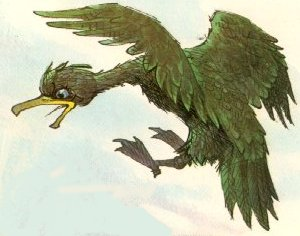No, all right, sorry, I'll be serious.
...
...
...
... no I won't.
Erm, right. The Oxford Comma is useful in the event of a list where the latter items look like they could be a description of the former - so 'I went to work for two ducks, Roderick and Clement' is unclear as to whether those are the names of the ducks, whereas 'two ducks, Roderick, and Clement' indicates clearly that your place of employment has a very strange management system. Of course, in this case, you could simply restructure the sentence - 'Roderick, Clement, and two ducks' - which resolves the ambiguity just as well. It also works around the problem that if I discuss 'two ducks, Roderick and Clement', you don't know if I'm simply failing to use the Oxford Comma, or actually discussing the named waterfowl. Abandoning the OC in favour of restructuring removes that ambiguity.
(Actually the best thing is to use either 'Roderick, Clement[,] and two ducks' or 'two ducks named Roderick and Clement' to remove all possible ambiguity)
There are other cases where the OC does absolutely nothing, because the ambiguity never existed. 'My parents were a hamster, an elderberry bush, and a giant wooden rabbit' works either way, unless you assume that a hamster can be 'an elderberry bush and a giant wooden rabbit', in which case, head down to FicPsych immediately.
Then, as Wikipedia is telling me, there are cases where the OC fails to resolve ambiguity. 'In the lands far to the north dwell Noggin the Nog, a cormorant and a knave'. Well, we know Noggin isn't a knave (he's a king), so let's put that Oxford Comma back! '...Noggin the Nog, a cormorant, and a knave'. Great! So, er, is Noggin a cormorant? (Answer: No, that's Graculus).
Again, in this case restructuring is the answer. We can't say 'a cormorant, Noggin the Nog, and a knave', because that could still imply poor Noggin is a bird. 'a cormorant, Noggin the Nog and a knave' is actually clearer in this instance, because you'd never use that structure to discuss the knavish cormorant Noggin. But in the end, the best structure is probably 'a cormorant, a knave, and Noggin the Nog' - which works exactly the same with or without the OC.
(And the final variant, with two names and one possible descriptor - 'I rode into Chippenham with Count Dracula, Marie Curie and the King of England'. Again, the OC is irrelevant - but put His Majesty anywhere else in that sentence, and you're making an... interesting political statement)
(And England doesn't have a king right now. Honestly, what are you like?)
hS
"In the lands of the North, where the Black Rocks stand guard against the cold sea, in the dark night that is very long, the Men of the Northlands sit by their great log fires, and they tell a tale..."


